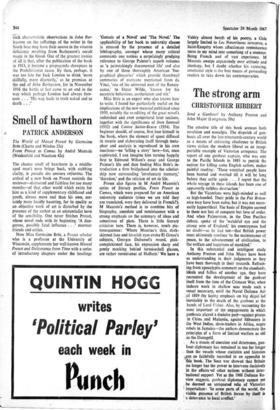The strong arm
CHRISTOPHER HIBBERT
The emotive title of this book arouses both revulsion and nostalgia. The dispatch of gun- boats all over the late-nineteenth-century world as a means of enforcing obedience to British views strikes the modern liberal as an insup- portable example of Victorian arrogance. The report of one gunboat captain, who was sent to the Pacific Islands in 1883 to punish the natives for killing some English sailors, makes painful reading: 'These wretched people have been hunted and worried till it will be long before they settle again . . . I regret that the whole voyage in these islands has been one of apparently ruthless destruction.'
But the Victorians were high-minded as well as high-handed. Their pride in the Pax Britan- nica may have been naive, but it was not neces- sarily hypocritical. The basis of Empire seemed to them not lust of conquest but love of order. And when Palmerston, in the Don Pacifico debate, spoke of the 'watchful eye and the strong arm of England,' his countrymen had no doubt—as he had not—that British power must ultimately conduce `to the maintenance of peace, to the advancement of civilisation, to the welfare and happiness of mankind.'
In this substantial and intelligent study Anthony Preston and John Major have been as understanding in their judgments as they have been thorough in their research. Refrain- ing from apocalyptic comment on the standards, ideals and follies of another age, they have recounted the development of the gunboat itself from the time of the Crimean War, when inshore work in shallow seas made such a vessel necessary, until the Naval Defence Act of 1889 (by laying emphasis on big ships) led inevitably to the death of the gunboat at the hands of Lord Fisher. Also, by recounting the most important of the engagements in which gunboats played a decisive part—against pirates in China and Malaysia, against filibusters in the West Indies, slave-traders in Africa, negro rebels in Jamaica—the authors demonstrate the principles of a form of limited warfare as old as the Danegeld.
As a means of coercion and deterrence, gun- boat diplomacy has remained in use far longer than the vessels whose statistics and histories ,are so faithfully recorded in an appendix to this book. The Suez war showed that Britain no longer has the power to intervene decisively in the affairs •of other nations without inter- national support. Yet as the 1966 Defence Re- view suggests, gunboat diplomacy cannot yet be deemed an antiquated relic of Victorian imperialism: 'In some parts of the world, the visible presence of British forces by itself is a deterrence to local conflict:


































 Previous page
Previous page